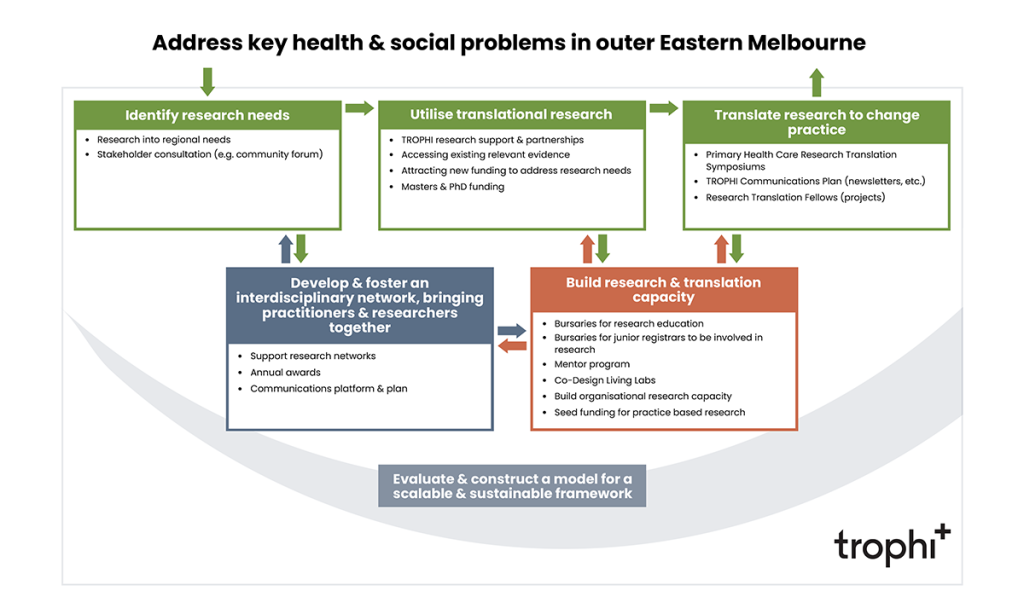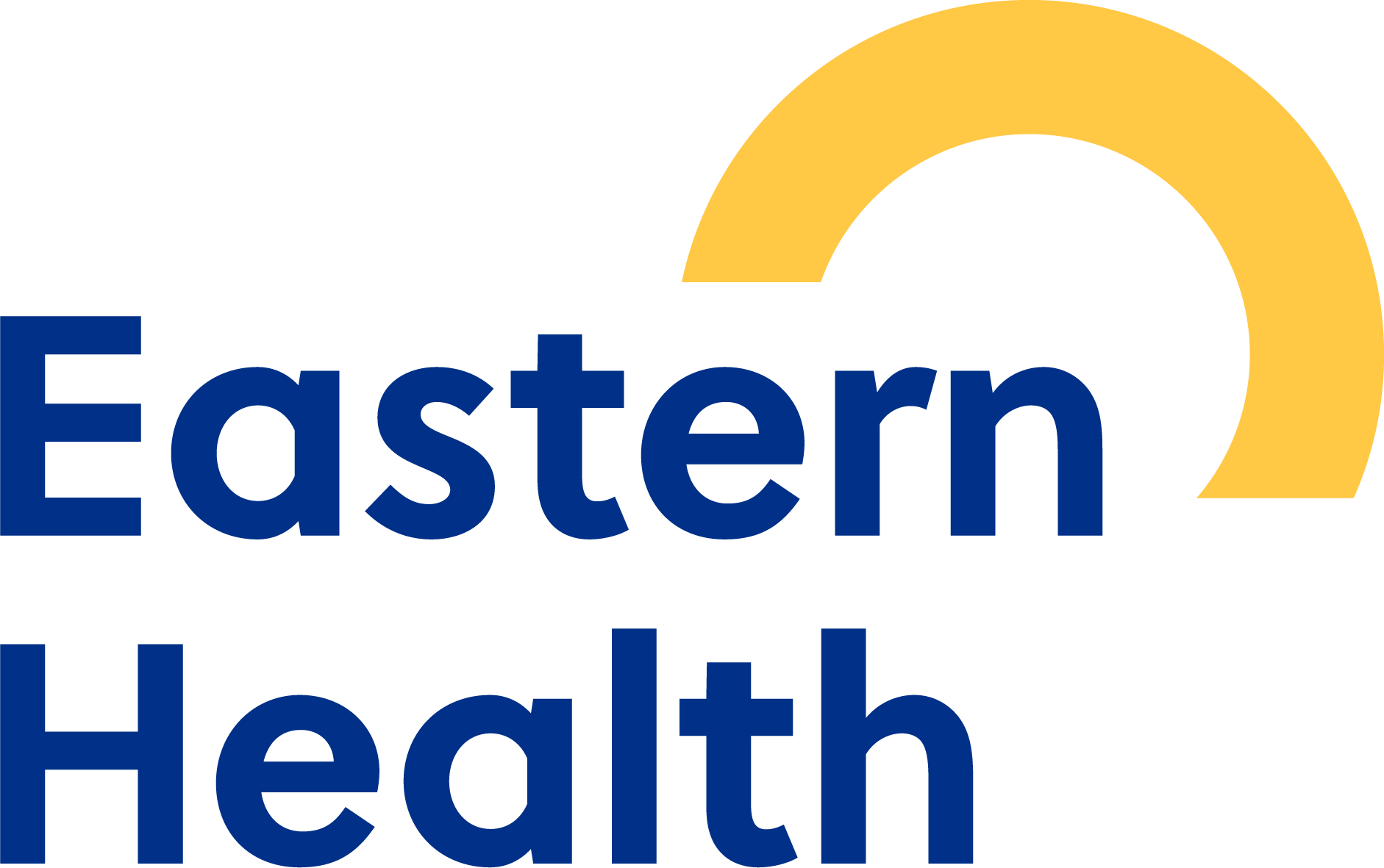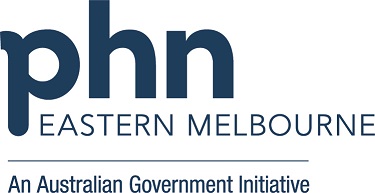About Us
TROPHI is about community – building a community of primary care researchers, consulting with community on health needs and delivering through a community of primary health care practitioners.
The Victorian Collaboration for Translating Research Outcomes into the Primary Health Interface (TROPHI) is a collaboration between the Monash University Department of General Practice, The University of Melbourne Department of General Practice and the RACGP, funded by the Windermere Foundation.
TROPHI aims to drive high quality implementation and translational research that provides contemporary practice-based evidence to improve primary health care and patient outcomes in the outer Eastern Melbourne region of Victoria, in particular the Knox, Maroondah and Yarra Ranges local government areas.
While the project is based in Melbourne’s east, TROPHI has the potential to use its research findings to inform local, state and national policies.
Through its collaborative network of GPs, decision makers, researchers and members of the community, TROPHI will drive high quality research to generate practice-based evidence to improve healthcare and patient outcomes.
See our consumer representative group here.

Over the first year of TROPHI collaborations with stakeholders, East Melbourne Primary Health Network, and Eastern Health have strengthened, contributing to an expanded regional health needs analysis and translational research opportunities.
The community’s regional priorities, identified through forums, stakeholder meetings, and consultations in 2023, encompass five themes for TROPHI’s focus:
These priorities are shared here – https://trophi.org.au/wp-content/uploads/sites/2/2023/12/trophi-community-needs-1.pdf
The 2024/25 TROPHI Region Needs Update outlines the most urgent health and wellbeing priorities across the Eastern Metropolitan Local Government Areas (LGAs) of Maroondah, Knox, and Yarra Ranges. Grounded in local evidence and shaped by strong consumer voice, the update identifies critical gaps that continue to affect community wellbeing.
Residents consistently reported challenges with long wait times for mental health support, poor access to affordable and timely neurodevelopmental assessments, and a system that remains reactive rather than preventative. Transport remains a key barrier, especially for carers, older adults, and young people in semi-rural areas. Families and carers are also calling for stronger support systems, particularly those navigating the NDIS. There is a clear push for care models that are trauma-informed, person-centred, culturally safe, and accessible close to home.
While councils are actively responding to local needs through planning and strategy, broader structural reform is needed. The report recommends embedding lived experience at all levels of service design, improving referral systems, building a more connected and culturally responsive workforce, and scaling up outreach-based models of care. Coordinated, place-based action is essential to shift systems toward early intervention, equity, and prevention.
The priorities guide planning, translational research, and collaborations with academic registrars in the region and align with the capacity building activities.
TROPHI remain committed to monitoring and addressing ongoing regional needs.
TROPHI’s capacity-building activities encompass a range of initiatives to enhance skills, partnerships, and research relevance in Melbourne’s Outer East. The program focuses on developing research capacity within the community, promoting collaborations between practitioners and academics. Key activities include:
For GPs, general practice staff, and primary health workers in the outer Eastern Melbourne regions of Knox, Maroondah, and Yarra Ranges. You will build connections with experienced mentors and grow your research translation skills.
There are $5000 bursaries for junior GP registrars and trainees from other primary care disciplines to support training or research involvement, and $1000 bursaries for primary care/general practice professionals, including GP registrars or medical students to support access to education aligned with TROPHI regional research needs.
$10,000 bursaries for GPs, GP Registrars, Practice Managers, Practice nurses, Aboriginal Health Workers, allied health and non-clinical primary care staff who have enrolled in MSc or PhD programs within either the Department of General Practice at Monash University or the University of Melbourne.
$10,000 bursaries for GPs, general practice staff, or primary health workers who are interested in completing a supported, practice-based research project. The project should focus on bringing research into practice and be aligned with a regional need.
Research Translation Fellowships are open to GPs, general practice staff, or primary health workers. Fellows will receive funding to work one day per week over a 12-month period on a research translation project, which meets a regional need.
Feedback captured from TROPHI forums has highlighted the gap that TROPHI fills.
“Before TROPHI there were good intentions and a couple of individual projects, but no thematic way of collaboration. TROPHI has brought the regional groups together well.”
“…there are opportunities big and small to get involved in research.. wonderful local projects that reflect innovation, partnership, passion and furthering the evidence base… start somewhere in your research journey and there is a network of mentors to support you.”

